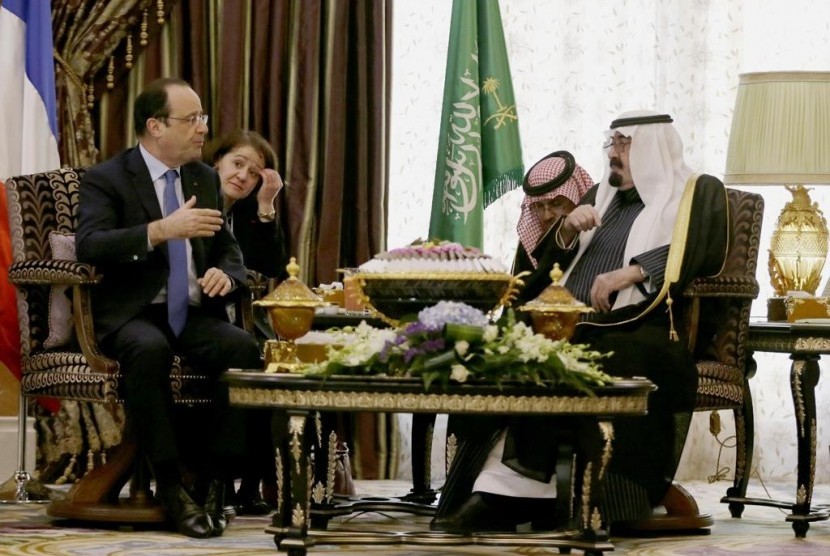REPUBLIKA.CO.ID, DUBAI - Increasingly vocal in its frustration over US policies in the Mideast, Saudi Arabia is strengthening ties elsewhere, seeking out an alignment that will bolster its position after it was pushed to the sidelines this year.
It may find a solution in France, whose president is ending the year with 24 hours of high-level meetings with the Saudi leadership in a visit intended to showcase commercial and diplomatic strength. With an entourage of French executives from the lucrative defense and energy sectors, President Francois Hollande arrived Sunday in Riyadh for a flurry of accords and contracts that have been in the works for months.
During their meeting Sunday, King Abdullah expressed his concern over the situation in both Iran and Syria to Hollande, and he praised what he called France's "courageous" position on these matters, according to a French official familiar with the discussions who would only speak on condition of anonymity in accordance with diplomatic rules.
At a news conference after the meeting, Hollande noted that the two countries' relations had deepened in recent months, in part because of their agreement on the crises in the region, including Syria's civil war and Iran's nuclear program. The two countries also find themselves unexpectedly aligned in resistance, if not outright opposition, to US policy on Syria's civil war and Iran's nuclear program.
Go alone
The Saudi ambassador to Britain, Prince Mohammed bin Nawaf bin Abdulaziz Al Saud, recently described the policies of some partners toward Iran and Syria as a "dangerous gamble," while calling for the kingdom to be more assertive internationally after decades of operating in diplomatic shadows.
"We cannot remain silent, and will not stand idly by," Prince Mohammed wrote in a Dec. 17 opinion piece in The New York Times.
"We expected to be standing shoulder to shoulder with our friends and partners who have previously talked so much about the importance of moral values in foreign policy," he wrote in the piece titled "Saudi Arabia Will Go It Alone."
In October, Saudi Arabia stunned diplomats when it rejected its first seat on the U.N. Security Council. The Saudi Foreign Ministry blasted the council for an "inability to perform its duties" in stopping the war.
"The problem in Syria today is ... clear negligence on the part of the world, who continue to watch the suffering of the Syrian people without taking steps to stop that suffering," Saudi Prince Turki Al Faisal, an influential member of the royal family and a former intelligence chief, said at a conference in Monaco this month.
The Syrian conflict, which has claimed more than 120,000 people and spawned a regional refugee crisis, has become in many ways a proxy fight pitting Saudi Arabia and other Sunni-led Arab states against Shiite powerhouse Iran, a major supporter of Assad.


